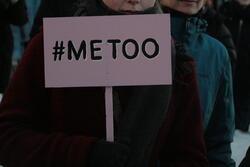Healthy Youth, Act!
My name was John, and I had been an upstanding varsity athlete and stellar student. In a shocking turn of events, I’d contracted HIV after a mistake at a party.
Then, the bell rang.
“We’ll finish up this activity tomorrow,” my health teacher announced, visibly relieved. I stared down at the sheet I’d been handed for the “dangers of STIs” role-playing activity. John, the student-athlete, had a grim future: he didn’t realize he had HIV, and passed it onto five other people.
I walked out of class that day feeling sick to my stomach. The purpose of the activity had been to scare us into embracing the supposed safe haven of abstinence, or at least the use of contraceptives (which, as my teacher warned, could always malfunction). But rather than giving us information about how to talk with our future partners about postponing sex, or where to purchase contraceptives, or how to find treatment for STIs, or how to talk to our parents about any of this, our teacher had simply terrified us.
This trend of passivity continued throughout most of the class. One day my teacher brought in a plush vagina, ostensibly to explain more about anatomy. Instead, he simply passed it around the class without once saying the word “vagina.” During an activity that was supposed to teach us about contraceptive use, he handed out plastic bags containing IUDs and other types of implants. He warned us about their potential failings, but didn’t say anything about the location of Title X clinics in Madison.
Then, on the last day of our absurdly short sex ed unit, the health teachers brought in a speaker from the local Rape Crisis Center (RCC). Whereas my regular teacher was unenthusiastic and uncomfortable, this speaker was passionate, informed, and approached sex education in a realistic, thorough way. Although their presentation caused lots of uneasy giggling, my class was finally forced to confront real, relevant issues. This, I realized, was what health class should be.
After the presentation, the speaker announced an opportunity for high school students to partner with the RCC: The GameChangers Youth Advisory Board. On the board, students would learn about the roots of rape culture, racism, and homophobia, and then disseminate this knowledge in the community. According to the speaker, students in the past had actively campaigned to transform health classes in the Madison schools through the creation of a toolkit for educators and meetings with committees of teachers. When the sign-up sheet made its way to my table, I eagerly put my information down. The presentation had proved sex ed could be changed for the better, and I wanted to become involved in creating that change. And now, I am!
GameChangers has opened my eyes to a new spectrum of experiences, identities, and pathways to change. With the board, I’ve listened and conversed with guest speakers who have expertise in racism, criminal justice, government, health, human trafficking, and education. We’ve researched and presented information on sexual assault, unpacking the roots and prevalence of rape culture. Using this information, we’ve questioned the way sex ed is taught and brainstormed new methods health teachers should be using. Being a member of this community has challenged me to speak up when I see injustice, ignorance, and inequity.
During GameChangers meetings, my fellow board members and I swap health class horror stories. It quickly became clear to me that inadequate sex ed was prevalent in more schools than my own. Teachers across our county had spent weeks on drug use and alcohol, while avoiding important and often overlooked subjects such as pregnancy and LGBTQ+ health. After doing some research, however, we learned that our seemingly dismal education may have been the best in Wisconsin. Our state, like 26 others in America, doesn’t mandate sex education. If it’s offered, abstinence must be stressed, and the information provided to students is not required to be medically accurate. Unfortunately for millions of teens across the country, these policies create more problems than they solve. Abstinence-based education promotes homophobic and sexist stereotypes, leaves teens uneducated on contraceptives, and, ironically, does very little to prevent sexual activity among teens.
Although the current state of sex ed in Wisconsin is terrifying, it’s also relatively new. Before former governor Scott Walker came into power in 2012, Wisconsin operated under the Healthy Youth Act, a law which broadened the scope of sex ed programs across the state. Under this act, schools that provided sex ed were required to provide information on anatomy, sexual orientation, sexual abuse, body image, and, most importantly, contraceptive use.
With no explicit mention of consent, menstruation, gender identity, or masturbation, this act still seemed inadequate by the GameChangers’ standards. Even without these crucial topics, however, we knew we needed to take immediate action to change the way sex ed was being taught in our state. Recently, we met with a prominent state assembly member’s aides to show our support for the act, offer our suggestions, and learn new ways we can facilitate its process through the Wisconsin Legislature.
The aides were receptive and encouraging to our suggestions, chiming in with their own sex ed anecdotes. As we were leaving the meeting, however, they expressed some doubt. According to the aides, it’s unlikely that the Healthy Youth Act will pass through Wisconsin’s notoriously conservative legislature. Even if it does, it won’t include the key topics we suggested, as the mere mention of masturbation has previously sent Wisconsin government officials and residents into a tizzy.
At first, it was hard to swallow the idea that immediate change is improbable, if not impossible. After moping around and feeling sorry for ourselves, my board members and I came to a realization: impactful change takes time. The process of providing high quality, relevant, and medically accurate sex ed won’t be easy, but we’re willing to invest all of our energy into this struggle. The GameChangers have already begun writing letters, and we plan to pester our representatives until they realize the necessity of comprehensive sex education, and do something about it. The future of teens in Wisconsin, and in states across the country, hinges on the implementation of this act, and we won’t stop fighting until it passes.
This piece was written as part of JWA’s Rising Voices Fellowship.







